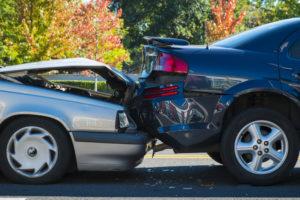
It is well established that texting and driving is a dangerous—even deadly—habit. So why do people text and drive? Among other reasons, drivers may text out of:
- Habit – they are used to checking messages frequently and reaching for their device without thinking about it.
- Recklessness – checking a text message does not take much time, so drivers may feel that it is safe to glance away from the road long enough to read or type out a message.
- Anxiety – studies show that being unable to use a smartphone for a longer-than-normal length of time makes many people nervous.
The Psychology Behind Texting and Driving
A 2020 study published in Cogent Psychology demonstrates that college students, many of whom check their phones 28 times a day, are very attached to their smartphones. Being unable to check their device, especially if they know a call or message is waiting for them, produces anxiety symptoms.
Such “separation anxiety” is not limited to college students: anyone accustomed to checking their phone regularly may decide that alleviating their anxiety is worth the risk associated with texting and driving. For example, a 2019 study by the National Highway Transportation Safety Administration (NHTSA) showed that:
- Fatal crashes involving a distracted driver accounted for 9 percent of all fatal crashes.
- Drivers aged 20-29 were most likely to be using a cell phone during a fatal crash.
- Drivers of all ages may cause a fatal accident due to cell phone distraction, though their likelihood of doing so steadily decreases after age 29.
For a free legal consultation, call 800-537-8185
Texting and Driving Can Be Deadly
The Insurance Information Institute (III) reports that distracted driving is the sixth most common cause of fatal car and motorcycle accidents in the U.S., accounting for over 3,000 fatalities in 2019 alone. Texting or looking at a cell phone is just one source of distraction for drivers.
Why is texting and driving so lethal? The Centers for Disease Control and Prevention (CDC) reports these three types of distractions make texting and driving particularly dangerous:
- Visual: If you are looking at your phone, you cannot concentrate on the road, even if you continually flick your gaze between the two.
- Manual: Texting requires that you take at least one hand off the steering wheel, making maneuverability more difficult.
- Cognitive: If you are reading a text or thinking about how to reply, you are not thinking about staying in your lane or avoiding oncoming traffic.
Many drivers who text behind the wheel argue that they only take their eyes off the road for a few seconds. According to the CDC, if you take your eyes off the road for just five seconds to read or send a text message while driving at 55 miles per hour, you have driven the length of a football field while giving little or no attention to the road.
Texting and Driving Laws
Not only is texting and driving dangerous, but it is also often illegal. As smartphones have increased, so have laws regulating phone use while driving. According to the Governors Highway Safety Association (GHSA), the laws in Arkansas, Alabama, Louisiana, and Mississippi are as follows.
- Arkansas: All drivers are banned from texting and driving. In addition, if you are in a school or work zone or are a minor, it is illegal to use any handheld device for any reason.
- Alabama: Texting is prohibited, as is the use of a handheld device by teens who have had an intermediate license for less than six months.
- Louisiana: Texting and driving are illegal. Any novice driver, teen driver, or driver in a school zone must not use a handheld device.
- Mississippi: This state bans texting and driving but only prohibits cell phone use for school bus drivers.
The penalties for texting and driving in each state vary. However, whatever penalty an individual receives would not be as devastating as the physical and psychological harm they inflict on themselves and others by causing an accident.
Click to contact our personal injury lawyers today
Tips to Prevent Texting While Driving
Even if you recognize the dangers of texting and driving, it can be difficult to break an old habit. To help you build new, healthier habits, you can:
- Turn your phone off while driving so you cannot be tempted by alerts or ringing
- Place your phone out of reach (e.g., in the back seat out of sight)
- Ask a passenger to hold your phone for you—or, if you are a passenger of a texting driver, ask them to stop texting.
- Talk to your children about the dangers of texting and driving, and model safe driving behaviors for them.
- If an emergency comes up and you must check your phone, pull to the side of the road or into a parking lot
As with any other habit, it can take a while to break the pattern of texting and driving. However, it is imperative that you do so as soon as possible: a single moment of distraction is enough to cause an accident.
Distracted Driving Includes More Than Texting
While texting and driving are one of the more infamous forms of distracted driving today, other distractions are harmful to drivers, passengers, and pedestrians as well. Motorists lose the ability to drive safely when they:
- Eat or drink while driving
- Engage in road rage
- Adjust the radio, mirrors, heat, or air conditioning
- Put on makeup while driving
- Turn to look at passengers
- Talk to someone on the phone
- Focus on a GPS app to try to navigate
Although many states have laws that put restrictions on phone usage while driving, other forms of distracted driving are usually not regulated. However, if a driver causes a car accident due to these behaviors, they may be liable for the damages and injuries that follow.
Learn More About Your Legal Options If You Were Injured By a Texting Driver
Understanding why people text and drive does not make their behavior any more excusable or take away the pain caused by a texting-related accident. The Morris Bart law firm wants to explain your rights and legal options. We believe the person at fault for your injuries should be held accountable, not you.
We have 15 office locations across Louisiana, Mississippi, Arkansas, and Alabama. For more information about how we can help you, call us today at (800) 537-8185.
Questions?Call 800-537-8185
to find a Morris Bart office near you.




